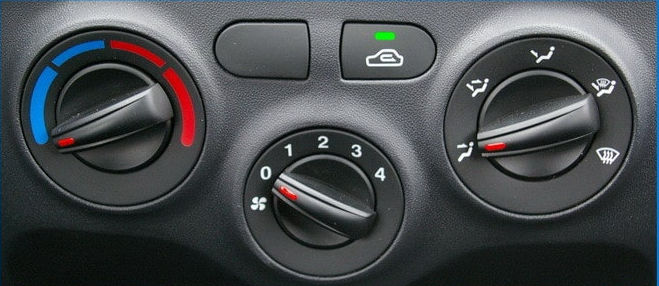

Mobile users:
For best results, view in Landscape mode.

A good working air conditioner is a must during
the Summer, especially when the humidity is high.
The most common cause of the air conditioner
to stop working is the refrigerant is low.
This could be caused from a leak somewhere in the system.
If your car is older than 1995, then you need to have your
refrigerant checked out by a licensed professional who
knows how to dispose of or recycle R-12.
In some states, it's illegal to refill a leaky system with R-12.
The good news is, even the older cars can be easily retrofitted to
use the newer, safer type of refrigerant called R-134a.
The air conditioning system is filled with high pressure refrigerant,
and operates at or over 200 psi, which could be very dangerous.
Plus, parts of the A.C. system can reach well over 150 degrees.
Even if you are a Do-it-Yourselfer, we recommend that you have
your mechanic service and recharge your A.C.
If it is low on refrigerant, however, you can recharge it using
a recharge kit you can purchase at your local auto parts store.
If you service your A.C. yourself, be sure to exercise proper
safety precautions.
Always wear eye protection when servicing air conditioning systems
or handling refrigerant.
And wear protective Chemical Resistant gloves to prevent PAG
lubricant contact with the skin.
PAG oil, or Polyalkylene Glycol, is a synthetic oil specifically designed
for automotive air conditioner compressors.
It is used in R-134a air conditioning systems to lubricate the
compressor.
To help avoid skin contact, mineral oil should be used to coat o-rings
and seals prior to installation.
PAG lubricants can also cause damage to paint, plastic parts, engine
drive belts and coolant hoses.
Don't allow refrigerants to come in contact with open flames and high
temperature surfaces.
Avoid breathing refrigerant and lubricant vapor or mist.
Exposure may irritate eyes, nose and throat.
Never add anything but the recommended refrigerant to
the A.C. system.
If you experience any of these problems, check with
your mechanic for professional advice or service.
The A.C. doesn't cool the car to a comfortable temperature.
The dash controls don't work when operated.
When the fan/blower works, it's louder than usual.
The blower doesn't work when set in A.C. mode.
There's loud noises when the heat or A.C. is turned on.
Visible signs of Refrigerant oil stain by the compressor, hoses,
pipes or fittings.
The car runs hot or overheats when A.C. is on.
The engine cooling fan quickly cycles on and off.
The heater, top and side vents, or defroster don't work.
Blocked air flow through the Condenser and Radiator.
The windows fog up when the defroster is turned on.
The car stalls or idles roughly when the A.C. is turned on.
There's water on the car's floor.
Maintaining your A.C. -
Turn the fan on high with the coldest settings once a week for
about 10 minutes.
Doing this will help maintain the gas pressure and keep the
compressor working properly and the seals from failing.
Try to do it throughout the year, even during the Winter,
to keep the air conditioner working.
Running the defroster is also important to prevent mildew and
other odors and clear away any excess moisture in the
system.
Run the defroster for about 10 minutes every week.
Check the exterior grills under the windshield.
Look for any leaves and other debris.
Taking the time to clear these things away will prevent them from
getting sucked into the air conditioning system and clogging it.
Also, open the hood and check the condenser.
Use a hose to clean out debris that could clog the condenser and
make it less effective.
Don't Pre-Cool your car.
If the interior is really hot, turn the fan on high when you start driving,
and open just the rear windows for about 10 to 20 seconds.
This forces all the hot air out of the car.
Your car air conditioning works better when you're driving, because
the faster the engine turns, the faster the A.C. compressor runs,
which lets the system cool more effectively.
Have your mechanic check your A.C. system regularly and have it
serviced about every 2-3 yrs.
The best time is in the Spring before it gets hot.
And Remember:
Never leave a child or a pet in a parked car on a hot day, not
even for a minute!
Disclaimer:
While we attempt to insure these tips
and information is complete and
accurate, these tips are merely a
recommendation to help save you time,
money and to stay safe on the road.
Check with your mechanic for
professional advice or service
before attempting to perform
any work you are not qualified
to do.

